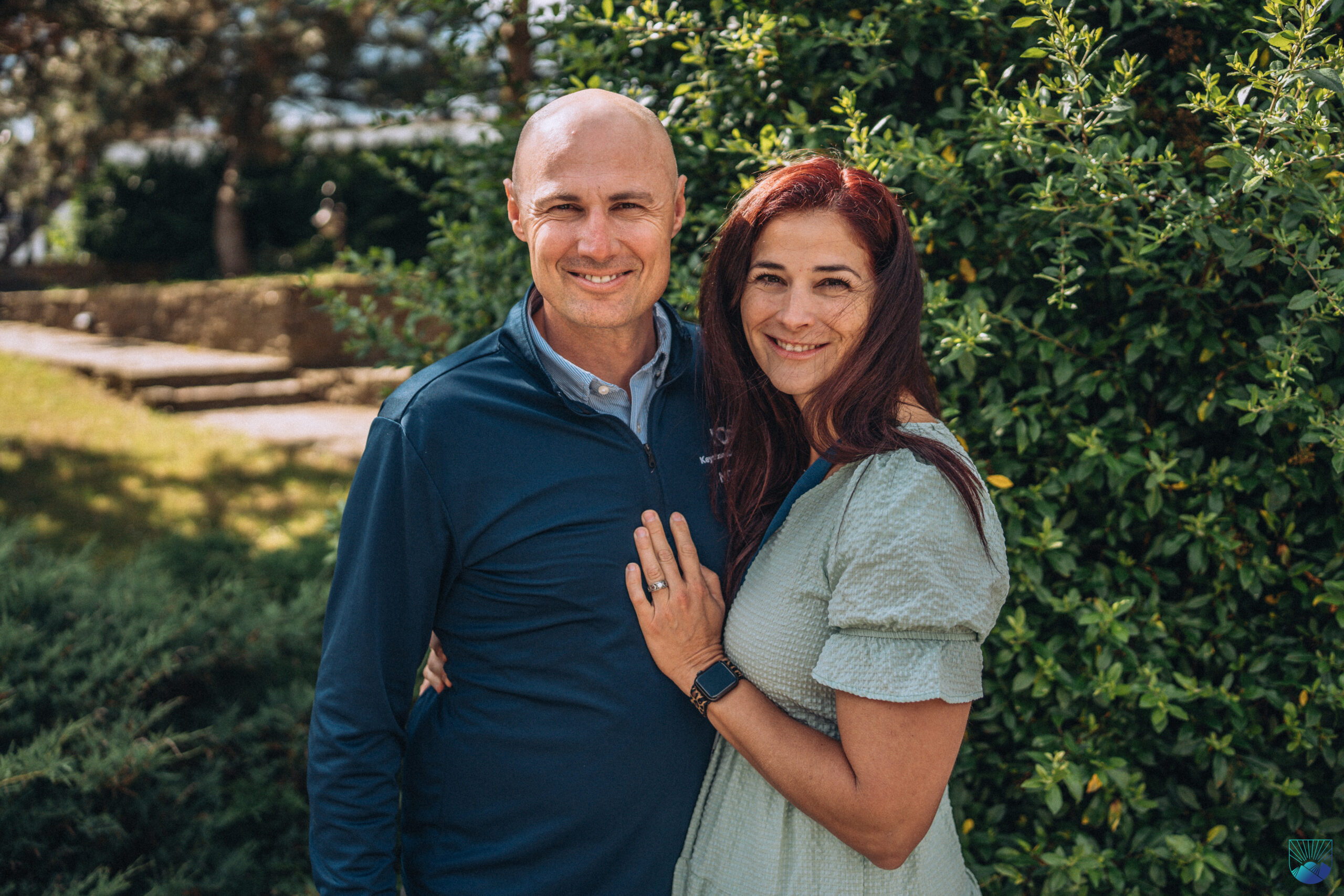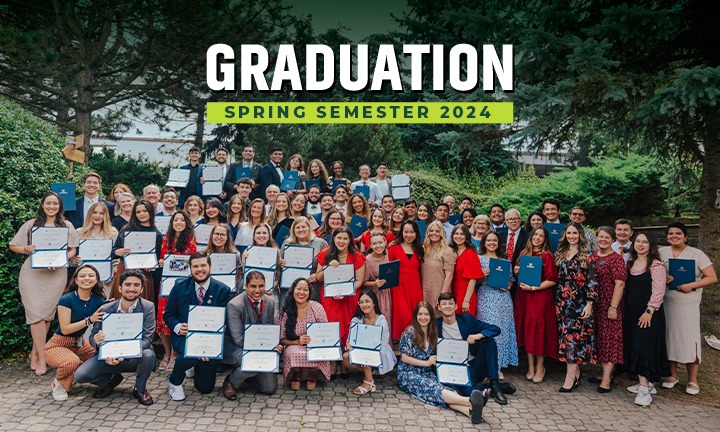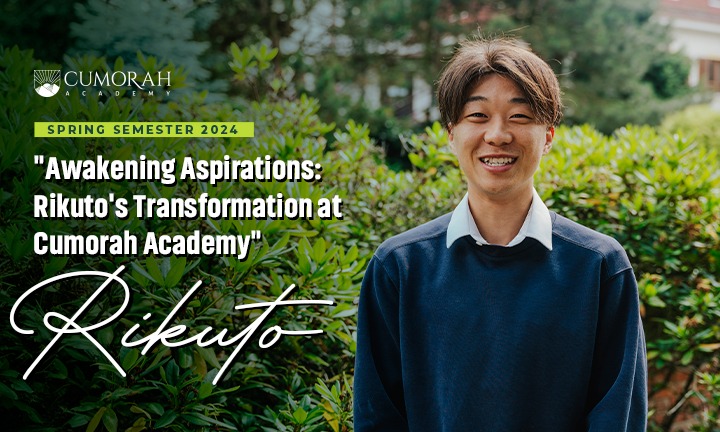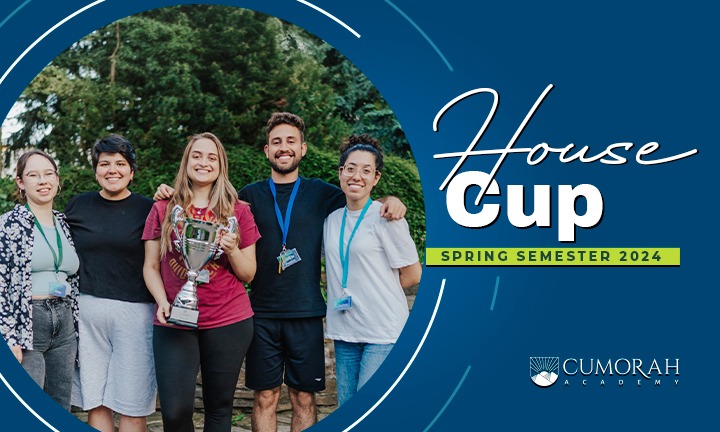The 11th week of the Spring Semester at Cumorah Academy had as guests the couple Davis as mentors for the students. Matt and Celeste live in Los Angeles (USA) and are parents of a 17-year-old daughter, and boys aged 12, 9, and 8.
Meet the Mentors: The Davis
Celeste loves being a mom and wife, loves Jesus, concerts, travel, powerlifting, and her dog. Working as an online health and fitness coach, she helps women get out of their own way, break generational chains, shatter self-limiting beliefs, and ultimately live lives of self-compassion and growth.
Matt is a Dental Consulting-Training-Coaching. He has had great success in sales, grown personally, and helped customers grow at the same time. On a frozen February morning in the year 2000, he was woken up by the news that his father had taken his own life. Matt was just 19 years old. His dad was a millionaire business owner, family man, and community leader. He had died with everything that anyone would perceivably want in life. He was a model for success, as the world sees it. This life-altering experience became the fuel for Matt’s quest to learn, live and teach others how to be successful and have a balance in life. Matt has spent the last 20 years forging success through balance, and he feels that his calling in life is to help others do the same. Through this work, Matt hopes to prevent those around him from feeling the way his dad felt at the end of his life. Dealing with psychological disorders
Cumorah Academy: A study published in the Journal of Unsighted Disorders in 2015 examined the relationship between self-efficacy and anxiety. The findings indicated that individuals with higher levels of anxiety tend to have lower self-efficacy beliefs, which can affect their motivation and hinder their perceived chances of success. This week, you shared with us that you have faced these disorders since you were younger, yet you still believe that you can achieve success. What has made you hold onto that belief, and what advice would you offer to someone struggling with similar conditions to believe in themselves as well?
Matt: I often struggle with anxiety, which leads to self-doubt and feeling inadequate. I believe that anxiety primarily affects the physical aspects of us, the natural man, as described by the prophet David. In those moments, I turn to my spiritual side for clarity and guidance. Relying on prayer, receiving promptings, and trusting in a higher power, that comes from above helps me see things more clearly and alleviates my anxiety. Despite its painful and debilitating nature, I consider anxiety a blessing because it has brought me closer to Heavenly Father and deepened my spiritual connection. If asked whether I would eliminate my anxiety, I would likely say no, as it has gifted me with valuable spiritual experiences and a heightened sensitivity to the spirit. As I grow older, I am learning to develop self-confidence while also relying on myself, but I have heavily leaned on Him for my confidence throughout the years. I believe that there is ample evidence in the world that shows improvement is possible when dealing with anxiety. Personally, I have found various methods that help me in my journey.
These include taking medication, attending therapy sessions, staying physically active, and seeking support from Celeste, my caregiver. The key takeaway is that anxiety can and will improve if you take the necessary steps to address it. If you choose not to take any action, it may worsen or persist. Some people may doubt the effectiveness of these approaches, assuming that anxiety will always be a constant presence. However, by actively managing it and engaging in strategies that promote well-being, life becomes much more enjoyable even during episodes of intense anxiety. Therefore, my main message to others would be that it is possible to lead a happy life, and things can significantly improve with the right actions.

Mindset improvement
Cumorah Academy: Celeste, you mentioned that your coaching approach for women’s health habits centers around kindness, compassion, and love. What advice would you offer someone to shift their mindset away from self-motivational methods that rely on shame or punishment?
Celeste: There’s a saying in the sphere of life coaching and personal development that encourages us not to believe everything we think. Our thoughts are not always factual, but perceptions influenced by past experiences and even by the whisperings of the Holy Ghost or a negative spirit. While I would like to believe that I have complete control over my thoughts, I have observed instances where thoughts seemingly come out of nowhere. Increasing self-awareness and not taking thoughts as absolute truth is crucial. It involves observing our thoughts without judgment and questioning their validity.
Is there any actual evidence or perspectives from others that challenge those thoughts? Our brains are wired for survival, and negative thoughts tend to be noticed more to protect us. However, it’s essential to recognize that we are safe and not let these thoughts define our self-worth. Reassuring ourselves and reminding us that our value is not determined by others’ judgments can help change our mindset. It takes time to shift from negative self-perception to self-acceptance, so starting with small steps and positive affirmations can be helpful. By noticing what we do well and focusing on the positive, we can create a more supportive environment for behavior change.
The importance of having mentors and networking
Cumorah Academy: About mentors, you shared that not just people, but also good books or movies can serve as mentors for someone on their journey. Why is it important to always be aware of mentor guidance, and to somewhat rely on it?
Celeste: Help them help you. Well, as I just mentioned, our brains often fail to notice the positive aspects and tend to focus on the negatives. However, we can change that. Having someone wise in the area we seek mentorship in is extremely beneficial. They can provide a more accurate perspective, acknowledging our strengths and guiding us in areas for improvement. Building a relationship of trust is crucial, as it allows us to apply the same principles we practice in other relationships to our self-relationship. Just like individuals from war-torn areas often struggle to trust others due to their experiences, developing self-trust is essential.
Keeping commitments to oneself is where confidence stems from, as we recognize that despite hardships, we will be there for ourselves, able to handle emotions and rely on our resilience. A mentor acts as scaffolding around a building, providing support until we are ready to stand on our own. Once the scaffolding is removed, we can confidently navigate our journey. That’s how my experience has been with my mentors—they offer honest feedback, help me recognize my strengths, and cultivate a healthy relationship, which I can then extend to myself.
Matt: Well, I believe a living mentor is like a library of books, so when somebody dies, it’s like a library burning to the ground, taking all the information they had with them. The biggest thing with mentors is that often we seek their advice when we have a problem and don’t feel good. However, simply feeling good is only half of the equation. Usually, people approach a mentor seeking advice for a specific problem. The mentor provides guidance that makes them feel good, but the problem arises when they fail to take action. So, I believe there should be two “yeses” when receiving advice. The first “yes” is feeling good about the advice, and the second “yes” is the commitment to take action based on the advice. If you don’t have access to the right mentor, books, podcasts, and other resources can be valuable. I promise you can find a book where someone has gone through a similar challenge, whether it’s in a war-torn country or a nation with a struggling economy.
Even fictional literature can be insightful. For example, you can read ‘The Grapes of Wrath’ to learn about a country with a poor economy and food scarcity. Whatever you take from the mentor or the book, you can store it in your pocket as confidence. They believe in you, and they have shown you the way because they have achieved it themselves. With their belief or by seeing someone else’s success in a book, you know that you can accomplish it too because it has been demonstrated. Let me share an example: Roger Banister, a medical school student, wanted to break the four-minute mile. Despite doctors and others saying it couldn’t be done, he achieved it. Interestingly, in the following six months, many more people broke the four-minute mile. This is what mentors or good books do. They show that something can be done, and human beings, once they see that, have the capability to do it again. However, there are a few pioneers who lead the way, like the first person to climb Mount Everest or fly over the Atlantic Ocean. These are the people we seek to follow and achieve the same.

Cumorah Academy: What’s the importance of networking for a leader?
There is a guy named Clayton Christensen who was the number one economic mind of the century, a really smart guy. He taught at Harvard Business School and was at the top of his profession. He wrote a book that I believe everybody should read, ‘How Will You Measure Your Life?’ I have a friend who ran into him at the shopping center and expressed their love for his book. He asked my friend what they liked about the book and if there were things they would have done differently. They sat down and discussed it for a while. It’s impressive that this famous individual took the time to listen and engage in conversation. This pattern of networking is also followed by general authorities of the church and other great leaders. They are lifelong learners, always eager to learn from others. If you were to meet a general authority, they would want to learn from you. I think the key to successful networking is understanding that every relationship holds value and that there is something to learn from every person.
The same applies to us when we engage in networking. Every person has value. I have another example involving a friend of mine who used to sell medical devices in orthopedics. He became friends with the custodian, Jimmy, who had special needs. Whenever my friend would see Jimmy, they would talk. One day, the head of the hospital approached my friend and said, ‘I hear you’ve been talking to Jimmy, the custodian.’ My friend confirmed their friendship, and then the person revealed, ‘Jimmy is my brother.’ It turned out that their products were being used in all the hospital’s facilities. My friend didn’t establish that connection to promote their products, but it serves as a reminder that everybody holds value and is important. Networking and exceptional leaders recognize that the most valuable asset in any company is its people.
Conclusion
The students at Cumorah Academy had the opportunity to deepen their understanding of the role of mentors and networking in personal and professional development. The stories shared by Matt and Celeste Davis exemplify the transformative impact of mentors who offer guidance, support, and a fresh perspective. Mentors can be found in various forms, including individuals, books, and other resources, allowing us to learn from their experiences and wisdom. Additionally, networking expands our connections, fostering opportunities for growth and learning from diverse perspectives. By embracing mentors and actively engaging in networking, we tap into a wealth of knowledge, gain self-confidence, and navigate challenges with resilience. Ultimately, these practices empower us to unlock our potential, cultivate meaningful relationships, and embark on a fulfilling journey of personal and professional excellence.




